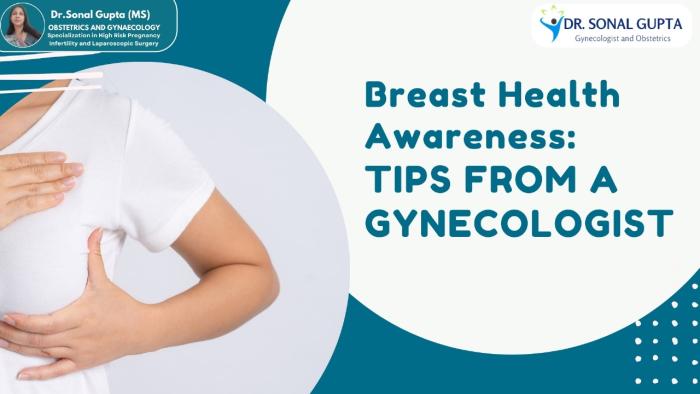- For Appointment: +91 9568139362
- Mon-Sat (10am - 8pm)
- drsonalgupta2@gmail.com
- Login

Jan 08, 2025 Dr Sonal Gupta
Breast Health Awareness: Tips from a Gynecologist
Learn essential tips from a gynecologist to maintain breast health, identify warning signs, and prioritize early detection for a healthier future. Breast health is a vital aspect of a woman’s overall well-being. Regular self-exams, awareness of changes, and timely medical consultations play a crucial role in preventing and managing potential breast-related issues. This blog offers expert insights into maintaining breast health and understanding the importance of early detection.
Breast health is a vital aspect of a woman’s overall well-being. Regular self-exams, awareness of changes, and timely medical consultations play a crucial role in preventing and managing potential breast-related issues. This blog offers expert insights into maintaining breast health and understanding the importance of early detection.
Why Breast Health Matters
Breast health is essential not only for preventing diseases like breast cancer but also for ensuring overall physical and emotional well-being. Women of all ages should prioritize breast health as part of their routine healthcare.
Tips for Maintaining Breast Health
-
Perform Regular Self-Exams:
-
Check your breasts monthly to identify any unusual lumps, changes in size, or skin texture.
-
The best time for self-exams is a few days after your menstrual period ends when breasts are least tender.
-
-
Schedule Clinical Screenings:
-
Visit your gynecologist or healthcare provider for regular breast exams.
-
For women over 40, annual mammograms are recommended for early detection of breast cancer.
-
-
Maintain a Healthy Lifestyle:
-
Balanced Diet: Eat a diet rich in fruits, vegetables, lean proteins, and whole grains.
-
Regular Exercise: Engage in at least 150 minutes of moderate physical activity per week to reduce the risk of breast cancer.
-
Limit Alcohol: Excessive alcohol consumption can increase breast cancer risk.
-
-
Know Your Family History:
-
Discuss your family’s medical history with your gynecologist to assess genetic risks.
-
Consider genetic testing if there is a history of breast or ovarian cancer in your family.
-
-
Be Alert to Warning Signs:
-
Lumps, swelling, or thickening in the breast or underarm area.
-
Changes in breast size, shape, or symmetry.
-
Nipple discharge, especially if bloody.
-
Skin changes like redness, dimpling, or peeling.
-
The Importance of Early Detection
Early detection is the key to successful treatment and recovery. Regular screenings and awareness empower women to identify abnormalities at the earliest stages, significantly improving outcomes.
Breaking Myths About Breast Health
-
Myth: Only women with a family history of breast cancer are at risk.
Fact: Most women diagnosed with breast cancer have no family history of the disease. -
Myth: Breast pain is always a sign of cancer.
Fact: Breast pain is often linked to hormonal changes or benign conditions. -
Myth: Young women don’t need to worry about breast health.
Fact: Breast health is essential for women of all ages, and habits formed early can have lifelong benefits.
Consult an Expert
Your gynecologist is your trusted partner in breast health. They can guide you on preventive care, recommend appropriate screenings, and address any concerns you may have.
Conclusion
Breast health awareness is a proactive step toward overall well-being. By adopting healthy habits, staying informed, and seeking regular medical advice, women can significantly reduce the risk of breast-related issues. For personalized care and expert advice, consult Dr. Sonal Gupta at Ojas Hospital. Visit https://drsonalgupta.in/index.php to schedule your appointment today.
